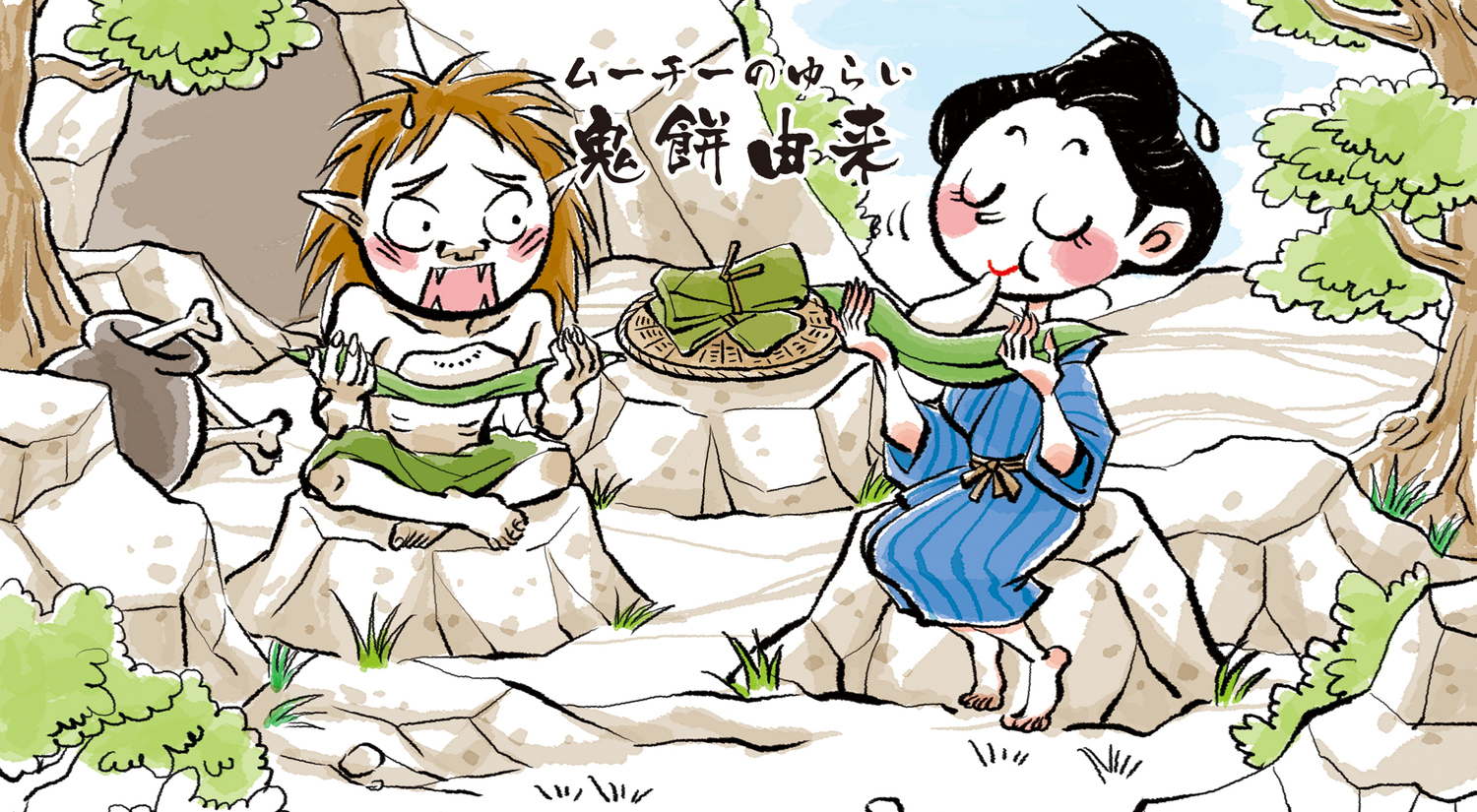The following is the legendary beginning of the annual event called Mūchī ムーチー (餅). The event takes place on December 8 of the lunar calendar, which usually falls into January of the Gregorian calendar. At that time, kids are given rice cakes to eat, meant to ward off man-eating demons. The cakes have various names, such as uni-mūchī 鬼餅 (demon-cake), chichara-mūchi 力餅 (power-cake) and others. When wrapped in sannin leaves (shell ginger) or kuba leaves (Livistona chinensis) they are called kāsā-mūchī.
It is probably one of the craziest stories you’ve ever heard from Okinawa. It is taken from the history work Kyūyō Vol. I, No. 14:
The Demon of Kinjō village in Shuri
In Kinjō village in Shuri lived an older brother and a younger sister. The name of the brother has not been handed down but the sister was called Ota-amu 於太阿母. Originally they lived in the same house in Little Peak (Kotaki), one of two sacred places on the Bengadake 弁ケ嶽.
At some point in time the brother moved to a cave in the north of Ōsato district. There was a rumor that he sometimes killed people and ate their meat, so the villagers called him the ‘Demon of Ōsato’ (Ōsato-oni 大里鬼).
One day his sister came to visit him, but he wasn’t home. Wandering around, she saw a kettle hanging in the kitchen inside the cave. Looking inside of it, shrank back: There was human flesh in it.
Terrified she left the cave and ran away towards her house. Not long on her way back, however, she encountered her brother…
“Why are you running home in such a hurry?” he asked. “I have very good meat! You should try it!”
“Sorry brother,” she answered, “I have important matters to care for at home.”
But he held her by force. Not able to say anything, she was led back to his cave.
Then she devised an unusual plan: when secretly pinching the thigh of the child she carried, the baby started to cry. The brother inquired about it and she said, “The baby needs to poop. Please let me go outside for a short while.”
But the brother said, “Let the baby take a poop in the back of the cave!”
“Taking a poop in the back of the cave is very rude,” she replied and firmly begged to be allowed to go to the outside.
Finally he agreed and allowed her to go out, but tied her hand to a long rope. Outside she succeeded to loosen the rope, fastened it to the branch of a tree, and secretly escaped. The brother, wondering why she did not return, looked outside and noticed she had fled. Chasing after her he arrived at the brow of the hill in the north when he saw her swiftly breaking away in the distance.
“Wait, wait!” he shouted loudly. As if being chased by a fierce tiger, she hid and managed to escape crouching on her stomach. For this reason that hill came to be referred to as the “Hill of Life and Death.”
Later the brother went to Shuri to find her. When she noticed him she hastily came up with a plan.
She summoned him to sit on top of the cliff at the seashore. She had prepared seven rice cakes for herself and also seven garlic roots. And she also offered him seven garlic roots and seven pieces of self-made iron rice cakes 鉄餅 – rice cakes filled with iron spherules. Of course the “demon” was unable to chew the iron rice cakes.
Oni-mochi.
From,: http://shuri-aruki.jp/folklore/moochie.htmlShe then sat down in front of him, raised raised her bottom shirt and spread out her legs. Distrustful he inquired about it. She looked him straight in the eye and while eating her own rice cake and garlic, she said, “There are two mouths in my body: the upper mouth is good at eating rice cakes. The lower mouth is good at eating demons!”
On seeing and hearing this, the demon panicked and stumbled backwards in terror. Then he slipped, fell down the cliff, and died.
Because of this incident, every year during the 12th month, on a chosen lucky day, the inhabitants of Ryūkyū make rice cakes and eat them to celebrate the vanishing of the demon.
For the same reason, since that time every year in the 12th month the people of Kinjō village in Shuri make six ‘demon rice cakes’ and offer them to the gods. And today, always on the 7th and the 8th day of the 12th month the Estate Steward (jitō) of Matsugawa packs 45 liters of rice at the Yonahadō rice field [in today’s Matsugawa in Naha] and offers it as sacrifice to the foundress of the village clan of Little Peak (Kotaki), i.e. the younger sister from the above story.
© 2016 – 2019, Andreas Quast. All rights reserved.

